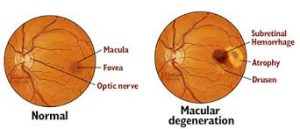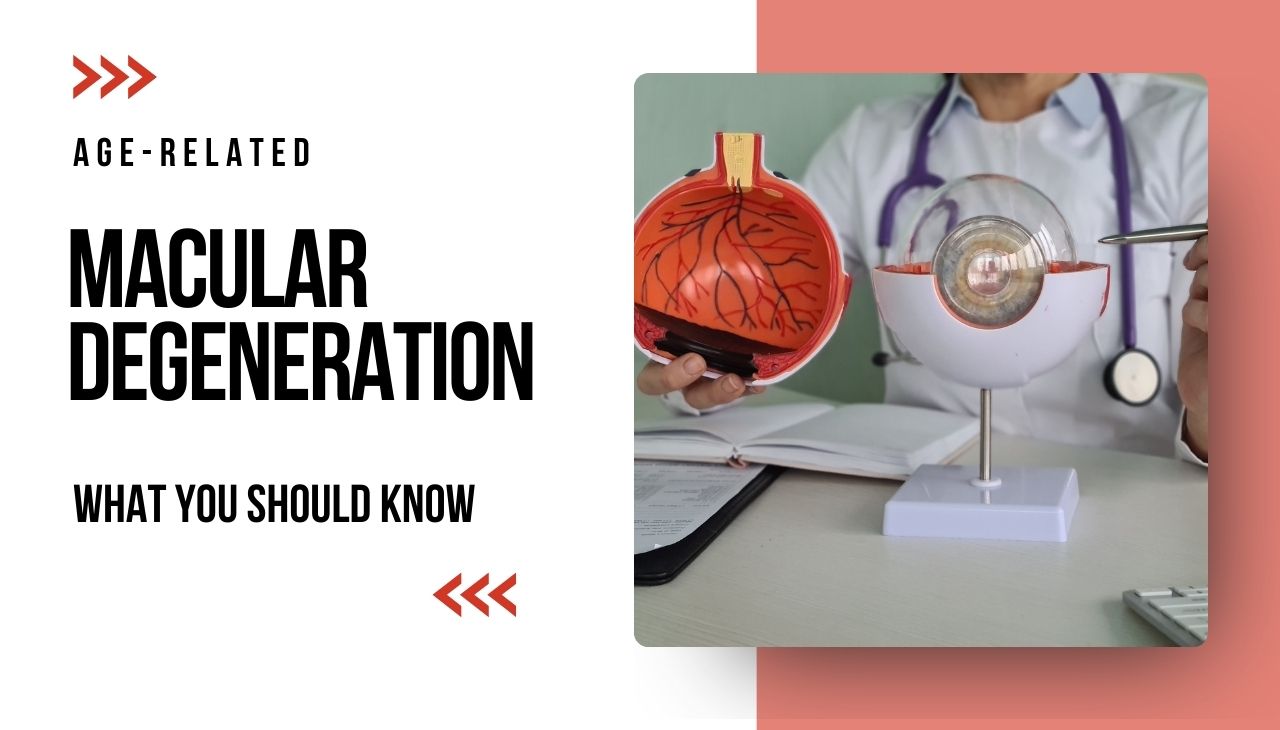Introduction
As we age, our eyesight naturally undergoes changes, but some conditions can significantly impact vision and quality of life. One such condition is Age-Related Macular Degeneration (AMD), a leading cause of vision loss among older adults. AMD affects the macula, the central part of the retina responsible for sharp and detailed vision. This blog will help you understand what AMD is, its causes and symptoms, available treatments, and how to protect your eyesight.
Understanding Age-Related Macular Degeneration (AMD)
AMD is a progressive eye condition that primarily affects individuals over the age of 50. It damages the macula, leading to blurred or distorted central vision while leaving peripheral vision intact.
Types of AMD:
- Dry AMD (Non-Neovascular AMD) – The most common form, occurring when the macula thins with age and small deposits (drusen) form under the retina.
- Wet AMD (Neovascular AMD) – Less common but more severe, caused by abnormal blood vessel growth under the retina, leading to leakage and scarring.
AMD does not lead to complete blindness but can severely impact daily activities like reading, driving, and recognizing faces.
Causes, Risk Factors, and Symptoms

Causes and Risk Factors
While the exact cause of AMD is unknown, several factors can increase the risk:
- Age: Most common in people over 50.
- Genetics: Family history of AMD increases the likelihood.
- Smoking: Doubles the risk of developing AMD.
- Obesity and Poor Diet: High-fat diets and lack of antioxidants contribute to AMD progression.
- High Blood Pressure and Cardiovascular Diseases: Can affect blood flow to the retina.
- Excessive Sunlight Exposure: UV rays may damage retinal cells over time.
Symptoms of AMD
Early detection is crucial, as symptoms develop gradually and can be subtle. Common symptoms include:
- Blurry or distorted vision, especially in the center.
- Difficulty recognizing faces.
- Straight lines appearing wavy or crooked.
- A dark or empty area in the center of vision.
- Increased difficulty in reading and performing tasks requiring sharp vision.
Treatment and Management Options
While there is no definitive cure for AMD, early intervention can slow progression and preserve vision.
1. Lifestyle Changes and Preventative Measures
- Healthy Diet: Eat leafy greens, fish rich in omega-3 fatty acids, and nuts.
- Quit Smoking: Reduces risk and slows progression.
- Regular Eye Exams: Early detection allows for better management.
- Protect Eyes from UV Rays: Wear sunglasses with UV protection.
- Exercise Regularly: Helps maintain healthy blood flow to the eyes.
2. Medications and Therapies for Wet AMD
- Anti-VEGF Injections: Drugs like ranibizumab (Lucentis) and aflibercept (Eylea) reduce abnormal blood vessel growth and leakage.
- Photodynamic Therapy (PDT): A light-sensitive drug is activated by laser to target and shrink abnormal blood vessels.
3. Low Vision Aids and Assistive Devices
- Magnifying glasses and reading aids.
- Specialized software for visual impairment assistance.
- Voice-assisted technology for reading and navigation.
Consult the Experts at Laxmi Eye Hospital
Laxmi Eye Hospital is one of Mumbai’s largest and most trusted eye care chains, providing high-quality treatment for AMD and other vision-related conditions. With over 30 years of excellence in the eye care industry, Laxmi Eye Hospital offers state-of-the-art diagnostic and treatment options at its locations in Panvel, Kharghar, Kamothe, and Dombivli.
Their team of experienced ophthalmologists specializes in:
- Specs Removal / LASIK (Bladeless LASIK, ICL & IPCL, Contoura Vision LASIK)
- Cataract Surgery
- Glaucoma Management
- Diabetic Eye Care
- Retina Treatment
- Pediatric Ophthalmology
Visit Us at:
- Laxmi Eye Clinic (Dombivli): 1st Floor, SS Business Park, Gharda Circle, Dombivli East, Mumbai, Maharashtra 421201.
- Laxmi Eye Clinic (Kharghar): Office 108-110, 1st Floor, Anant CHS, Sector 04, Kharghar, Navi Mumbai, Maharashtra 410210.
- Laxmi Eye Hospital & Institute (Panvel): Mulla Hamid Rd, Old Panvel, Navi Mumbai, Maharashtra 410206.
- Laxmi Eye Institute (Kamothe): Shop No. 26/27, Near ICICI Bank, Pratik Gardens, Sector 34, Kamothe, Maharashtra 410209.
Book an appointment today to ensure the best care for your vision.
FAQs
1. Can AMD be cured? No, but early diagnosis and treatment can slow its progression.
2. How often should I get an eye exam if I am at risk? If you are over 50 or have a family history of AMD, get an exam at least once a year.
3. Is AMD hereditary? Yes, genetics play a role, but lifestyle changes can help reduce the risk.
4. Does diet affect AMD? Yes, a diet rich in antioxidants, omega-3s, and vitamins C & E can help protect vision.
5. Can I drive if I have AMD? It depends on the severity. Consult an eye specialist to assess your vision for driving safety.
6. What is the difference between dry and wet AMD? Dry AMD involves gradual thinning of the macula, while wet AMD results from abnormal blood vessel growth under the retina, causing leakage and rapid vision loss.
7. Are there any new treatments being developed for AMD? Yes, researchers are exploring gene therapy and stem cell treatments, but they are still under clinical trials.
Conclusion
Age-Related Macular Degeneration is a serious but manageable condition if detected early. By making healthy lifestyle choices, getting regular eye check-ups, and seeking expert care, you can protect your vision and maintain a good quality of life. If you or a loved one is experiencing symptoms of AMD, consult the specialists at Laxmi Eye Hospital for the best guidance and treatment. Prioritize your vision today!

